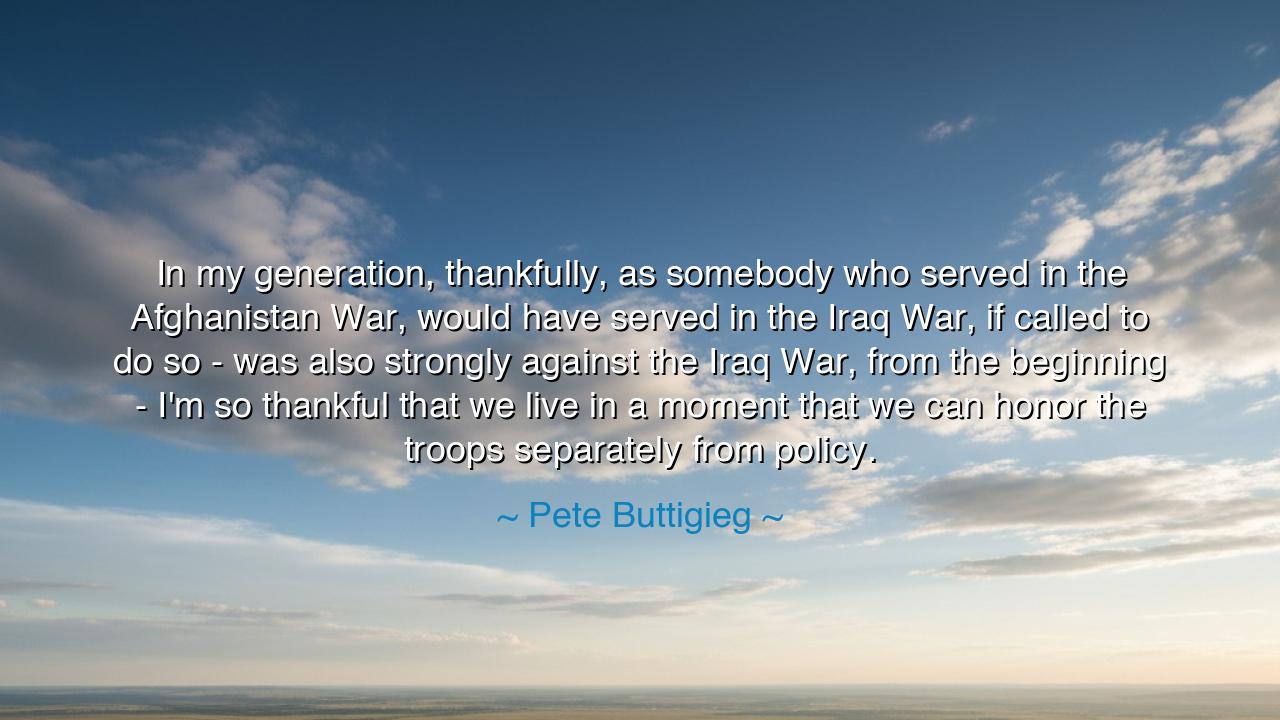
In my generation, thankfully, as somebody who served in the
In my generation, thankfully, as somebody who served in the Afghanistan War, would have served in the Iraq War, if called to do so - was also strongly against the Iraq War, from the beginning - I'm so thankful that we live in a moment that we can honor the troops separately from policy.






Hear the words of Pete Buttigieg: “In my generation, thankfully, as somebody who served in the Afghanistan War, would have served in the Iraq War, if called to do so—was also strongly against the Iraq War, from the beginning—I’m so thankful that we live in a moment that we can honor the troops separately from policy.” These are not words lightly spoken, but the reflection of one who has carried both the uniform of service and the conscience of dissent. They teach us that gratitude for the warrior can exist even when one rejects the war, and that the dignity of those who serve should never be chained to the decisions of rulers.
The origin of this reflection lies in the long years of conflict that defined a generation. The wars in Afghanistan and Iraq shaped the early 21st century, demanding sacrifice from countless soldiers, even as the wisdom and justice of those wars were debated fiercely at home. Buttigieg, having worn the uniform himself, speaks from the tension of those times: he was willing to serve, even to die, if called; and yet his conscience opposed the policy of invasion. In his words, we find both humility and gratitude—that America has grown to a place where we can honor the troops separately from the policy.
History shows us that this distinction was not always honored. In the era of the Vietnam War, soldiers often returned not to parades, but to protests, blamed by some for a policy they did not shape. Many who fought bore not only the scars of battle but the sting of rejection from their own countrymen. It was a wound deeper than the battlefield: to risk one’s life for the nation, only to be dishonored by the nation itself. Buttigieg’s words speak as a healing response to that wound, a recognition that the mistakes of policy must not erase the honor of sacrifice.
There is also a lesson here about the unity of a people. To honor the soldier does not mean to glorify war; to reject war does not mean to dishonor the soldier. The two can—and must—be held apart. This distinction allows a nation to remain humble before the truth of its policies while still reverent toward those who risked everything in obedience to duty. Buttigieg calls his generation blessed for this wisdom, for it spares the soldier the burden of carrying the nation’s political divisions upon his back.
But his words also remind us of the fragility of gratitude. It is not natural for nations to separate policy from service—it is something that must be learned, often through pain. The lesson of Vietnam, the debates of Iraq, the sacrifices of Afghanistan—all these carved into America a wisdom hard-won: that even if wars divide, the honor of those who served should unite. Gratitude for the troops becomes a unifying force, transcending party and opinion, reminding us that citizenship demands both conscience and compassion.
What lesson, then, must we take? That we must never confuse the one who serves with the one who commands. The soldier does not choose the war; he chooses only loyalty, duty, and sacrifice. To honor him is to honor the best within ourselves—the courage to serve others before self, regardless of policy. To oppose a war, yet still honor the warrior, is to live in the maturity of gratitude, a maturity that strengthens nations rather than divides them.
Practical actions flow from this teaching. Speak words of gratitude to veterans, not only on days of remembrance but in the ordinary flow of life. When you debate policy, do so with clarity and conviction, but keep your respect for the soldier untarnished. Teach younger generations that gratitude for service is not endorsement of war, but recognition of sacrifice. And above all, carry forward the principle that thankfulness for the troops must never be lost, even when policies falter.
Thus, let Pete Buttigieg’s words endure: to honor the troops separately from policy is to preserve the dignity of sacrifice while still preserving the conscience of a nation. In this balance lies wisdom, in this balance lies unity, and in this balance lies the truest form of gratitude.






AAdministratorAdministrator
Welcome, honored guests. Please leave a comment, we will respond soon